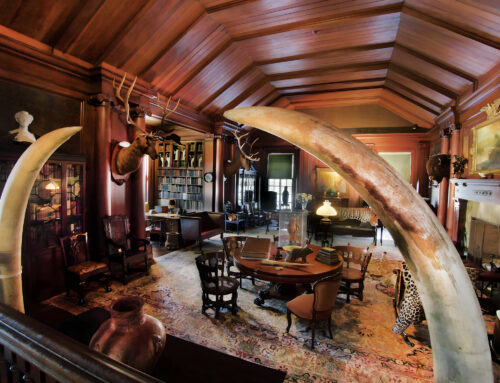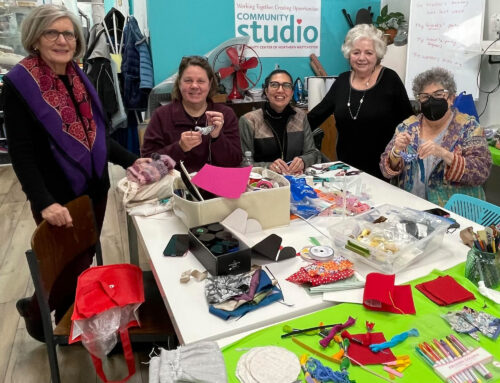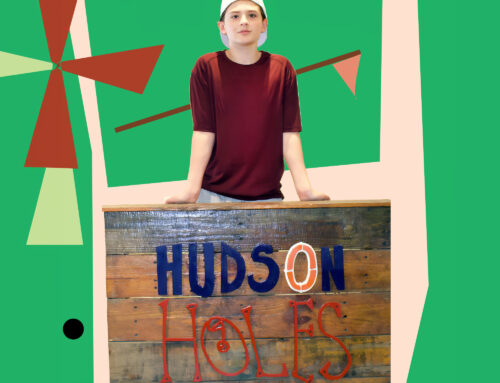Writing by Ava Fleisher
Artwork by Zoe Stevens
As Wendy Belzberg strolled through the quaint streets of Rhinebeck, something suddenly became obvious: Every town should be doing this. Rhinebeck had established a concrete initiative to tackle the issue of inclusion by creating accommodations for people who are neurodivergent – an issue that is often swept under the rug. In nearly every window, she saw a decal that explained their business received sensitivity training to accommodate people with varying abilities and needs. Belzberg, who has an adult daughter who is neurodiverse and a love for her town, eagerly brought the idea to Bedford.
According to the National Library of Medicine, it can be reasonably estimated that 15 to 20 percent of the U.S. population is neurodivergent in some way. The term “neurodivergent” describes people who receive certain diagnoses like attention-deficit/hyperactivity disorder (ADHD), dyslexia, dyspraxia, sensory processing disorder (SPD) and autism spectrum disorder (ASD). People who are neurodivergent may share similar traits; however, they have incredibly diverse lived experiences and needs.
Throughout our region, various groups are working to make aspects of their towns more accommodating. The Pound Ridge Human Rights Advisory Committee, Bedford’s Neurodivergent Taskforce and the Lewisboro Playground Improvement Project all share the mission of making their respective towns as welcoming and inclusive as possible for people who are neurodivergent; the overall goal is a more unified community.
Planning
Belzberg, the chair of Bedford’s Neurodivergent Task Force, has dedicated a lot of her time and energy to making her dream a reality.
“This wasn’t something we just did,” Belzberg points out. “It was something that took time.”
When she learned what Rhinebeck had done, she began her work by reaching out to Rinebeck’s mayor, who generously offered his time and support. She learned that Rhinebeck’s efforts were inspired by a community in Laredo, Texas, and folks there shared several resources with her, too.
“I called a man who was a part of the work being done in Laredo and asked, ‘We want to do it in Bedford; how do we do this,’” she explains.
So, after research and cold calls, she formed a small group who shared her same concerns, and they made a plan to assemble an official task force to address inclusion and accommodations for Bedford’s neurodivergent population.
The town board approved their proposal for a task force on March 21, 2021, but that was just the beginning.
Meanwhile, neighboring towns were taking steps to make their communities more welcoming places for people who are neurodiverse. Next door, the Lewisboro Playground Improvement Project had spent the past several years carefully and extensively planning their inclusive playground. With the intention of creating a greater sense of community and togetherness among people from the area regardless of age, ability or need, Valerie Cancro, the group’s president and project manager, began small as well.
“In 2018, a small group got together in the library, just talking about the safety and design of the playground and what we could do to improve it,” she recalls. “It took about a year or so to get the team together and solidify our idea for a nature-inspired, inclusive playground.”
The group became a 501(c)(3) non-profit and expanded their team. When the pandemic hit, however, their plans were put on hold. In 2020, they regrouped, welcomed new committee members, began the four-stage design process and started fundraising so they could purchase “the right equipment.”
Just as Belzberg researched Rhinebeck’s and Laredo’s initiatives, Cancro did “field research,” as she likes to call it, observing what other towns did to make their playgrounds as accessible and inclusive as possible.
“We found these amazing playground equipment companies that go beyond just ADA compliance and actually create inclusive spaces,” Cancro says.
They fundraised for over a year and a half before starting construction in October 2022. Thanks to the mild winter that year, before they knew it, the Lewisboro Playground Improvement Project had its grand opening in June 2023.
Around the same time, in 2019, the Pound Ridge Human Rights Advisory Committee (HRAC) began their work. They were part of a larger effort to “promote cultural understanding, mutual respect and inclusivity.”
“Our demographic has changed since the pandemic, with many new residents moving to town, so it is important that we proactively create a sense of belonging for everyone, including those who have neurodivergent family members or children,” say co-chairs Shabari Bose Kamat and Namasha Schelling.
The HRAC works to ensure that any and all initiatives they put in place are accessible to those who are neurodiverse. The town park, Scotts Corners, the town house and the town pool have all been updated over the past few years with the committee’s guidance and diligent planning to cater to those with a wide variety of emotional and physical needs.
Sensory initiatives
Being neurodiverse-friendly is a process that requires tangible action and community participation. One of the main issues they’ve tackled is the various sensory needs (lights, sound, touch, etc.) of many people who are neurodiverse.
The Neurodivergent Task Force worked with the Bedford Playhouse to offer monthly movie screenings for people with specific sensory needs. They turn the lights up slightly and the volume down, so it’s a bit brighter and not quite as loud. Some restaurants in Bedford also offer diners the opportunity to call ahead and reserve a table in the back, where it may be quieter.
“I’ve had a mother tell me that she can’t go to a movie with her neurotypical child because she doesn’t have childcare and can’t take her neurodiverse child to the movies,” Belzberg points out. “So something like that is what [the screenings] at the Bedford Playhouse are perfect for. And we’re talking about having some sort of sensory kit in every store for people who need sensory input.”
In Lewisboro, the new playground features equipment and surfaces with different textures, a music center and even a block wall that forms a cave-like structure with dim, natural lighting and critter-like features that kids can touch and feel.
“We designed it with the idea to stimulate senses,” says Cancro.
In Pound Ridge, the new Village Green offers residents who are neurodivergent many seating options to recharge when overstimulated. This includes a low rock wall, the grass oval, and various chairs and benches. The space is also structured for people to exit crowds easily, which can become essential when overwhelmed.

Inclusion accommodations
On October 23, Bedford’s Neurodivergent Task Force held their first in-person, two-and-a-half-hour training, facilitated by the Anderson Center for Autism. They educated local businesses on what diversity truly looks like and how to sensitively handle certain behaviors and situations. Businesses, including the Katonah Museum of Art, Caramoor and even hair salons signed up, and Belzberg hopes the October training session was the first of many to come. Over 65 people representing 14 businesses/organizations attended and the next training is scheduled for January.
The task force also includes a resource subcommittee that collects items for families and individuals who are neurodiverse by making a list of businesses that participate in neurodiverse inclusive initiatives.
“Depending on the setting, the accommodations can be different,” Belzberg explains. “It’s not one size fits all.”
The Human Rights Advisory Committee agrees, and they are continuing to create inclusive spaces in Pound Ridge. The newly updated sidewalks, seating areas and water fountains are accessible to everyone, regardless of physical ability and/or needs.
New seating areas were included in the Lewisboro town playground as well, addressing the needs of potential caretakers and family members. Most of all, the playground promotes a sense of togetherness, thanks to equipment that is accessible and blended.
“We have this particular piece of equipment called the friendship swing,” Cancro says. “I think it’s one of my favorite pieces because it’s designed to seat several people of all ages.”
The swing helps siblings, children and adults play more collaboratively with one another. Other pieces, like the pretend farmer’s market and a wheel-chair accessible merry go round, also promote collaboration among community members of all ages and abilities while bridging a possible division between people who are neurodivergent and those who are not. Cancro’s committee also hopes to purchase a communication board that uses a photo system for children who are non-speaking so they can communicate at the playground.
“I think this is prompting social interaction, having common spaces and embracing neurodiversity,” Cancro explains.
She believes the playground has been a great success since its re-opening, with people coming for play dates, to spend time outside or to enjoy the Food Truck Fridays in the summer.
How you can help
Each group says information from the public plays a vital role. Bedford’s Neurodivergent Task Force even has a subcommittee entirely dedicated to surveying the area. This group was responsible for drafting and distributing a survey to the town about the experiences of families with members who are neurodiverse. They wanted to know if people who are neurodiverse felt welcome or accommodated, and they asked for suggestions on how to better support people who are neurodiverse.
Today, Belzberg says the task force has reached nearly one hundred percent of their goals, and they plan to disband and become a separate entity in the near future. The businesses that participated in the training facilitated by the Anderson Center for Autism will receive a decal – the same ones found in Rhinebeck.
The Human Rights Advisory Committee also deeply values data from residents.
“Our data collection will be a springboard for future initiatives and events,” say Kamat and Schelling. “It will inform our next steps and ensure that what we advise the town to do will truly meet the needs and wants of our residents, not just check a box.”
Because their work covers multiple disciplines, they say people’s feedback is a cornerstone of their efforts to make Pound Ridge a more supportive place; they encourage community members to write them at [email protected] and provide “feedback on what improvements would make living in Pound Ridge more comfortable for [people who are neurodiverse] and their families.”
Cancro says that now, the best way to support the Lewisboro playground is to simply visit it often and have fun.
Belzberg says making our towns more supportive communities for people who are neurodiverse can become a personal responsibility, too.
“I think that people in the community need to be educated so they understand what neurodiversity means,” she explains. “I think that will lead to empathy, compassion and acceptance.”
This article was published in the November/December 2023 print edition of Connect to Northern Westchester.

Ava Fleisher
Ava Fleisher is Connect To's star intern and a local high school student. When she’s not writing, you can find her spending time outdoors, reading, or volunteering in her community. When she grows up, she would like to pursue a career in journalism and travel the world.










